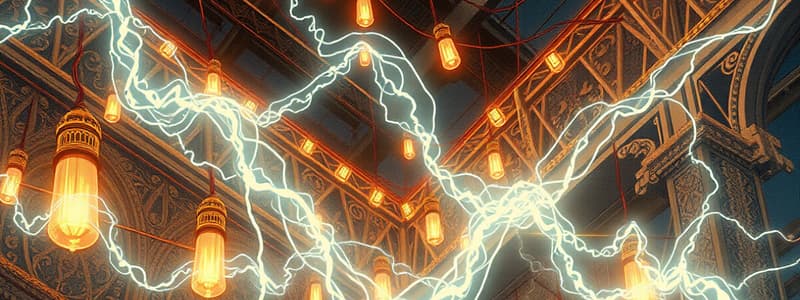Podcast
Questions and Answers
What is an electric current?
What is an electric current?
A flow of electric charge, often carried by moving electrons in a wire.
What is direct current?
What is direct current?
- An electric current with variable flow
- An electric current applicable only in power supplies
- An electric current that reverses its direction
- An electric current that flows in one direction (correct)
What is alternating current?
What is alternating current?
- An electric current that reverses direction many times a second (correct)
- An electric current that flows in one direction
- An electric current typical for batteries
- An electric current with zero resistance
What is an electrical conductor?
What is an electrical conductor?
What is electrical insulation?
What is electrical insulation?
What does resistance determine?
What does resistance determine?
What is a superconductor?
What is a superconductor?
What is potential difference?
What is potential difference?
What is voltage?
What is voltage?
What is a battery?
What is a battery?
What does Ohm's law state?
What does Ohm's law state?
What is an electric circuit?
What is an electric circuit?
What is a series circuit?
What is a series circuit?
What is a parallel circuit?
What is a parallel circuit?
What is a fuse?
What is a fuse?
What is a circuit breaker?
What is a circuit breaker?
What is grounding?
What is grounding?
What is electrical power?
What is electrical power?
Flashcards are hidden until you start studying
Study Notes
Electric Current
- Electric current refers to the flow of electric charge, typically conveyed by moving electrons in a wire.
- Can also be carried by ions in electrolytes or a combination of ions and electrons in plasma.
Types of Current
- Direct Current (DC): Flows steadily in one direction.
- Alternating Current (AC): Reverses direction multiple times per second, commonly used in power supplies.
Conductors and Insulators
- Electrical Conductor: Materials that allow free flow of electric current (e.g., copper); insulators prevent flow, having high resistance.
- Electrical Insulation: Materials with tightly bonded valence electrons that resist electron flow, used in electrical equipment.
Resistance and Superconductors
- Resistance: A property that limits current flow; higher resistance results in less current for a given voltage.
- Superconductors: Materials that can conduct electricity without resistance, allowing indefinite current flow without energy loss.
Voltage and Potential Difference
- Potential Difference: The difference in electrical potential between two points in a circuit.
- Voltage: The electromotive force or potential difference measured in volts.
Power Sources and Circuits
- Battery: A container with cells that convert chemical energy into electrical energy.
- Electric Circuit: A conducting path external to the battery that enables charge flow between terminals.
Circuit Types
- Series Circuit: Contains a single path for current; if one component fails, the entire circuit stops.
- Parallel Circuit: Offers multiple paths for current; if one path fails, others can still operate.
Safety Devices
- Fuse: A safety device that interrupts current flow during overloads to prevent damage.
- Circuit Breaker: A switch that automatically opens to stop current flow when it exceeds safe levels.
Grounding and Electrical Power
- Grounding: Allows electrical charges to move freely between a conductor and the ground, enhancing safety.
- Electrical Power: The rate of energy conversion in electrical systems, measured in watts (W).
Studying That Suits You
Use AI to generate personalized quizzes and flashcards to suit your learning preferences.




